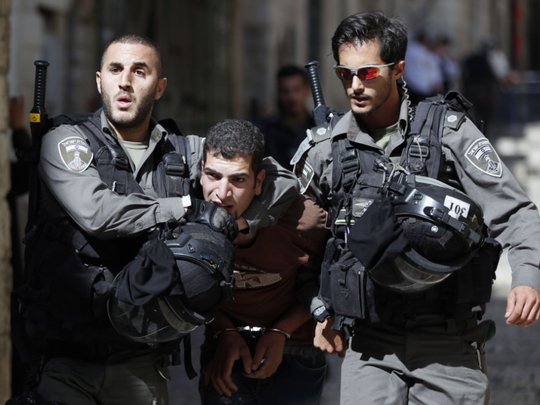
There is no radical change in Iran’s stand; Tehran is still maintaining its policy towards many Arab countries, said UAE’s Al Bayan. “Gulf Cooperation Council [GCC] countries avoid conflicts and wars and believe in good neighbourly relations. Iran, however, is not sounding out any indications that it’s intending to improve its relations with neighbouring GCC countries. Both parties share a history and relations that span many centuries. Today, it’s those relations that oblige Iran to reconsider all the threats it poses to GCC countries in the areas of sectarian incitement, political interference in internal social structures or financially backing any domestic parties. The UAE sincerely hopes that Iran will settle all pending issues with Arab countries, and for everyone to strive towards consolidating security and stability.”
America’s stand regarding the nuclear agreement was clear and it contained prerequisites that would ensure the Gulf’s security, particularly through international assurances that deprive Iran from acquiring a nuclear weapon, said Saudi Arabia’s Al Yaum. “However, such assurances are not enough because Iran’s behaviour is not very promising, and what is truly worrying for the region is Iran’s record when it comes to human rights, interfering in the affairs of Arab countries, as well as financing and backing terrorism. The region is looking to combat terrorism and extremism and once again shift into plans for development and urbanisation, not spending billions on fighting terrorism and its tools in the region. The GCC is looking forward to Iran regaining its position in exchange for the militias and gangs, so that it can become a contributor to security and stability in the region. This requires a clear Iranian stand towards regional crises, and not interfering in Arab affairs.”
The killing of Palestinians by the Israeli Occupation has become almost a daily occurrence, whether carried out by the military or gangs of colonists in the Occupied Territories of Jerusalem, the West Bank and the Gaza Strip, said Oman’s Al Watan. “Every week, a Palestinian is killed and every day more than 10 Palestinians are arrested. On Monday alone there were many terrorist attacks and violations against the Palestinian people and Al Aqsa Mosque. Twenty-year-old Palestinian Mohammad Abu Latifa was killed in Al Qalandia refugee camp, coinciding with the systematic desecration of Al Aqsa Mosque that was raided by dozens of colonist gangs for two days in a row under the protection of the Israeli Occupation forces. International officials did not utter a single word on these crimes, as if they never occurred.”
Israeli attacks are a flagrant violation of international law and provoke the sentiments of the entire Muslim nation, said Qatar’s Al Sharq. “Israel bears the full responsibility if it continues to carry out such systematic attacks against Al Aqsa Mosque. In light of these recent dangerous attacks against the mosque, the national responsibility of Palestinians is to unify their ranks, bridge the gap between each other and to be open towards national reconciliation, which has been stalled for many years. The situation as its stands is dangerous and its repercussions might be even more dangerous. More than ever, the international community, and particularly the United Nations Security Council, must stop being silent and covering up for the Israeli occupation’s crimes for more than 60 years.”




_resources1_16a31069e4e_small.jpg)




